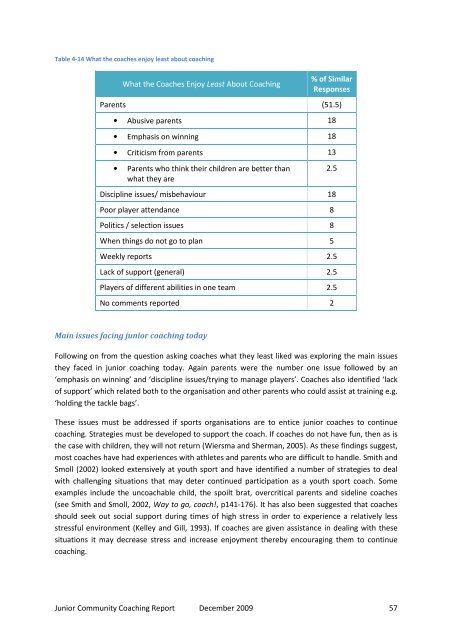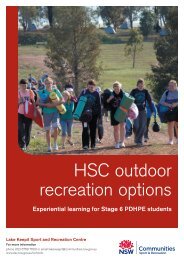Community Junior Sport Coaching final report - 2009
Community Junior Sport Coaching final report - 2009
Community Junior Sport Coaching final report - 2009
You also want an ePaper? Increase the reach of your titles
YUMPU automatically turns print PDFs into web optimized ePapers that Google loves.
Table 4-14 What the coaches enjoy least about coaching<br />
What the Coaches Enjoy Least About <strong>Coaching</strong><br />
% of Similar<br />
Responses<br />
Parents (51.5)<br />
• Abusive parents 18<br />
• Emphasis on winning 18<br />
• Criticism from parents 13<br />
• Parents who think their children are better than<br />
what they are<br />
Discipline issues/ misbehaviour 18<br />
Poor player attendance 8<br />
Politics / selection issues 8<br />
When things do not go to plan 5<br />
Weekly <strong>report</strong>s 2.5<br />
Lack of support (general) 2.5<br />
Players of different abilities in one team 2.5<br />
No comments <strong>report</strong>ed 2<br />
2.5<br />
Main issues facing junior coaching today<br />
Following on from the question asking coaches what they least liked was exploring the main issues<br />
they faced in junior coaching today. Again parents were the number one issue followed by an<br />
‘emphasis on winning’ and ‘discipline issues/trying to manage players’. Coaches also identified ‘lack<br />
of support’ which related both to the organisation and other parents who could assist at training e.g.<br />
‘holding the tackle bags’.<br />
These issues must be addressed if sports organisations are to entice junior coaches to continue<br />
coaching. Strategies must be developed to support the coach. If coaches do not have fun, then as is<br />
the case with children, they will not return (Wiersma and Sherman, 2005). As these findings suggest,<br />
most coaches have had experiences with athletes and parents who are difficult to handle. Smith and<br />
Smoll (2002) looked extensively at youth sport and have identified a number of strategies to deal<br />
with challenging situations that may deter continued participation as a youth sport coach. Some<br />
examples include the uncoachable child, the spoilt brat, overcritical parents and sideline coaches<br />
(see Smith and Smoll, 2002, Way to go, coach!, p141-176). It has also been suggested that coaches<br />
should seek out social support during times of high stress in order to experience a relatively less<br />
stressful environment (Kelley and Gill, 1993). If coaches are given assistance in dealing with these<br />
situations it may decrease stress and increase enjoyment thereby encouraging them to continue<br />
coaching.<br />
<strong>Junior</strong> <strong>Community</strong> <strong>Coaching</strong> Report December <strong>2009</strong> 57

















